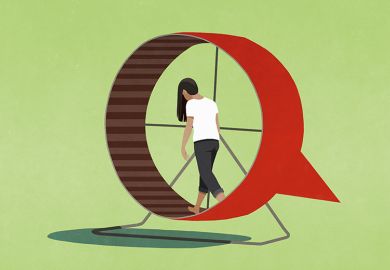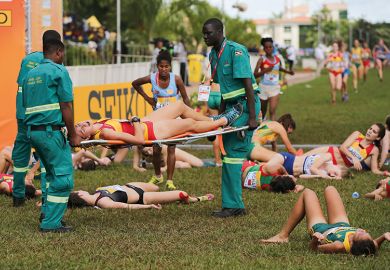US universities owe their faculty and staff for helping them survive the pandemic, and many still need to make concrete changes in conditions to avoid losing those essential workers over time, institution strategists have warned.
The uncompensated debt goes “beyond a thank-you breakfast”, Chris Moody, executive director of the American College Personnel Association, told academic colleagues at Times Higher Education’s THE Campus Live US conference in Los Angeles.
“It starts with a true look at reconciliation for those who were harmed by their employer or by their campuses during the pandemic,” said Dr Moody, whose group represents student affairs professionals nationwide.
Another expert, Renée Ann Cramer, the deputy provost of academic affairs at Drake University in Iowa, said the pandemic had helped to illuminate truths that include the fact that institutions should stop leaving individual workers with open-ended boundaries of potential job responsibility.
Professor Cramer said she interviews all candidates for faculty jobs at Drake and tells them directly: “Work-life balance doesn’t exist – it’s a myth, and it makes us feel worse about ourselves, it makes us responsible for somehow not having boundaries around these essential things that we do, which is serve our students, love our jobs, love our research, and support our colleagues.”
They and other experts addressed the THE conference amid ever-rising indications that faculty and staff have not recovered from the unprecedented stress and burdens put on them over the past two-plus years of pandemic response.
A new global survey on work-life balance by THE suggested the extent of the problem. It gathered nearly 1,200 responses from more than 70 countries, with 44 per cent saying they were likely to leave higher education in the next five years because of excessive workloads.
Another, in the US by the College and University Professional Association for Human Resources, involved more than 3,800 higher education employees and found nearly two-thirds of them saying that they had taken on additional responsibilities as other staff had left since the start of Covid shutdowns.
An institutional strategy aimed at telling workers that they should try to find a work-life balance was harmful, said Professor Cramer, a professor of law, politics and society at Drake, “because in large part what it does is make the worker responsible for what the institution is not prepared to do”.
“This particularly impacts women, who have been told by the mainstream feminism of the 1980s and 1990s that if we only could have it all, we could have it all,” she said. “And having it all makes us feel increasingly burnt out.”
Drake is taking steps that it hopes will help to address the situation, including conducting “stay interviews” – a counterpart to exit interviews – in which faculty and staff are regularly asked to describe their experiences, Professor Cramer said.
The nearly 5,000-student private campus also has promised that all academic staff who taught during Covid will be allowed a “two-course release” at any time they choose over the next seven years, and it has agreed to give faculty the option of pausing their “tenure clock” if they prefer, Professor Cramer said.
Another colleague, Janina Montero, the interim executive director of the career centre at the University of California, Los Angeles, said the pandemic had helped UCLA to understand that staff could work remotely, stay at home if they were sick and figure out unusual schedules. “Clearly, there’s been a rethinking of work,” Dr Montero told the THE conference.
Register to continue
Why register?
- Registration is free and only takes a moment
- Once registered, you can read 3 articles a month
- Sign up for our newsletter
Subscribe
Or subscribe for unlimited access to:
- Unlimited access to news, views, insights & reviews
- Digital editions
- Digital access to THE’s university and college rankings analysis
Already registered or a current subscriber?








